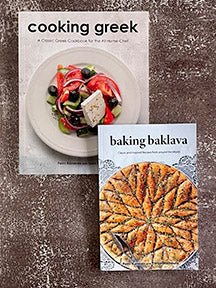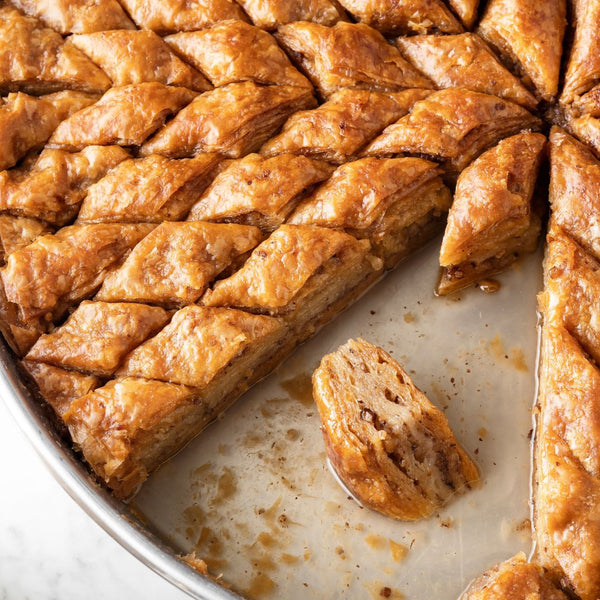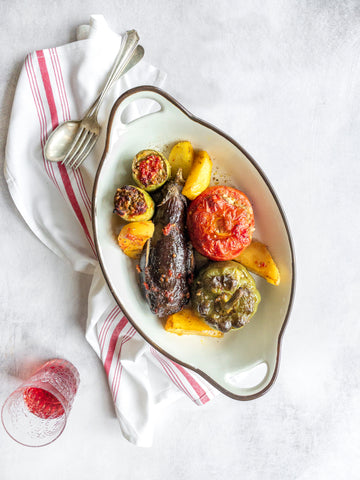Your Cart is Empty
SHOP
SUMMER SPECIALS
RECIPES
BLOG
ABOUT US
Meet Cookbook authors, Pam & Tanya
8 min read

In the latest edition of Greek Women inBusiness, I had the pleasure of interviewing Pemi (Pam) Kanavos and Tanya Stamoulis, authors of Cooking Greek: A Classic Greek Cookbook for the At-Home and Baking Baklava: Classic and Inspired Recipes from Around the World.
Tell us a bit about yourselves and your background
Pam: I was born in Boston, and moved with my family to Athens, Greece, when I was eight. As soon I shed the fears and reservations any 8-year-old would have about moving to a new city, I traded them in for a head over heals, life-long love affair with this historic city that continues till this day.
I spent 11 impressionable years in Greece. Many of my strongest memories are from this time and not surprisingly, most of them have to do with food. I returned to Boston for college, where I earned a degree in graphic design. Yet my passion for cooking was so strong that I chose to return to school and received a second degree from the Cambridge School of Culinary Arts.
I worked in various Boston restaurants, wrote columns for Greek food blogs, taught cooking and baking workshops for several years. I am also a cooking expert/moderator on WorldwideGreeks.com. After several years of moving back and forth between Boston and Athens, I have finally settled in Athens, Greece, with my husband and son.
Tanya: I live in Boston with my husband Nick and 2 boys and have an M.S. degree in Computer Science from Bentley University. I spent 17 years working in the software and non-profit industries before changing course to join my husband in the digital marketing world. I had the luck of growing up in a strong Greek household that was always filled with family and friends sharing meals and enjoying each other‘s paréa (company) which fostered my love of cooking and hosting.
Sharing this passion for all things Greek with my husband, we decided to start WorldwideGreeks.com, a space to celebrate, preserve and share our Greek heritage, culture and cuisine with the world. WorldwideGreeks.com offers a Greek cooking forum that has been used by Greek food lovers to discover the world of Greek cuisine. We also launched GreekBoston.com which is a site for all things Greek.
How did you two meet and start working together?
It may seem cliché, but we met at Greek school while waiting for our children to finish class! The kids would go to class, while a bunch of mothers would hang out and wait for them. I believe these women had more fun than their children in Greek school. We would bake tsourekia(Greek sweet bread) and make tirópita (with handmade phyllo, of course!) in the school’s kitchen together. We were the PTO and organized kálanta (Greek Christmas carols), the Independence Day parade, and the Greek school fundraiser. So you might say we started working together before we formally began.
Tell us about the books, what pushed you to publish them, what inspired you?
Pam: During our time at Greek school, Tanya and I would see how difficult it was to keep what we called “THE GREEKINESS” going among our kids, how to keep our kids together, and keep these Greek friendships going. Sure, they had their school friends and that was great, but who would be their koumbaro/a, who would baptize their kids? And even worse, who would cook them fakes or gemista?! A Yiayiá, or grandmother, in a Greek family is usually the one maintaining the connection to the culture and food. But many had no Yiayiá or the Yiayiá was 2nd or 3rd generation and couldn’t teach them the traditional recipes.
Tanya: We had always thrown around the idea of creating a Greek tselementé (handbook/primer) of our time, something that our kids, as well as anyone who would love to learn to cook everyday Greek food, could have as a reference. We talked about it for years, but didn’t do anything until Pam moved to Greece and our boys were older. One day, I called Pam and said, “Hey, wanna write that cookbook?” and the rest, as they say, is history.
We finally wrote “Cooking Greek” as our homage to the recipes that fed us and past generations, with the hope that these recipes continue to feed new generations.

Why a whole book on baklava?!
After we published our first cookbook, "Cooking Greek", we started talking about what's next. There were so many options, and we spent endless hours exploring the possibilities and creating drafts of different books, without landing on the right one. One day, we attended an event and were seated at a table with guests of various ethnic backgrounds. The dessert for the event happened to be baklava with ice cream. As we dug into our flaky sweet treats, one of the women said, “Mmmm, there’s nothing like a good Armenian baklava to end a meal.” One of the men at the table turned to her and said with a twinkle in his eye, “You are welcome.” We all looked at him curiously and he continued – “Baklava was invented by the Turkish people and neighboring countries such as Armenia adopted it, changed a few ingredients and claimed it as their own.” The table fell silent at first, and then a spirited debate ensued. We discussed everything from the Ottoman empire to the Byzantine empire. Examples were given of a 13th Century Arabic cookbook with mentions of a baklava-like dessert and an 8th century Assyrian dessert made of unleavened bread, nuts and honey. Even our Italian friends joined the conversation, with claims that Ancient Rome had a similar dessert in the 2nd Century! Of course, as Greeks, we put in our “two cents”, citing Gastrin, which is an ancient Greek dish and an ancient version of baklava.

It was a passionate, yet light-hearted debate, a debate that made us realize that baklava is one of the most beloved, contested, and multi-culturally embraced desserts in the world. It was at this event that the idea to create this book began.
We all know that baklava is such an amazing dessert and easy one too. However, there is lot of fear towards phyllo dough. People believe that phyllo is very tricky to use. Bakers are afraid that if they handle phyllo incorrectly, they will damage whatever they are preparing with it. As a result, most of us shy away from preparing our own baklava and instead end up buying a pan of readymade baklava from the bakery.
For baklava lovers, like us, though, it is very challenging finding a good pan of baklava. Baklava, when done perfectly, is a delicate blend of crunchiness and chewiness. The flavorful richness of the nuts tempers the cloyingly sweet syrup. Unfortunately, many people end up eating baklava that is too sweet and flat, too moist or too dry, because they rely on bakeries. One of the goals of this book was to empower bakers, even beginners, to make baklava at home with joy and confidence. Everyone's palate is different and by making baklava at home and experimenting with the flavors and sweetness, every pan can be perfect.
The book however is not just a collection of traditional baklava recipes. We created a dozen delicious Baklava-inspired recipes, paying homage to a classic with modern twists, such as: Baklava Cheesecake, Chocolate Hazelnut Baklava, Caramel Apple Baklava Rolls, Caramel Chocolate Peanut Crinkle Baklava, Bacon-Pecan-Cognac Baklava, Baklava Ice Cream Tarts, Chocolate Peanut Butter Baklava and more. This book is a celebration of baklava in all its forms, from all different countries. It is beloved by so many and this book is our attempt to make it accessible to everyone.
What do you love the most about your Greek culture?
Pam: Being so laid back, sometimes so much so that it gets them into trouble. But it’s that stepping backness that brings the Greeks into the present moment, allowing them to relish it. And that manifests itself in their connections with family and friends, in their family dynamics, and in their food and how they prepare and consume it. Understanding Greek culture and food (which go hand in hand) requires more than just yelling ópa, drinking wine and smashing plates. It goes beyond simply putting feta in a dish, switching to Greek yogurt or using lemon, olive oil and oregano in every recipe. It is more than just Greek salad, spanakópita, and souvlaki; it's about discovering regional cooking styles, methods and traditions that define our rich heritage. It reflects our laid-back attitude and presence. It embraces cooking and eating seasonally, using foods that are readily available, as well as practices that have been passed down through generations. We don’t do this on purpose to preserve the authenticity of our food culture, but rather to connect with our family, land and heritage. This is who we are.
Tanya: I love the fact that family, both by blood and relationships, is such a big part of Greek culture. Gathering together over a meal or to catch up over coffee is a big part of who we are. We open our doors and arms to others and invite them to be part of our families. Through baptism of our children and participation in weddings, we invite others to be part of our families. Growing up, we even used to give our friends 'Greek Names' and tell them they are now part Greek! We love to invite people into our world and share stories, food and happy times together.
Favorite Greek food and favorite place in Greece?
Pam: Anyone who has visited Greece knows that there are several places to see. Mykonos and Santorini in the Aegean, Nafplio and Mani in the Peloponnese, Athens, Thessaloniki, and several lesser-known destinations. But if I had to pick one spot to highlight, it would be Xalazoni, a little village on the southern tip of the Peloponnese. This is my village. This is where I learned what real food was and where it came from. This is where I was taught that an ingredient, no matter what it is, does not need to be hidden underneath layers upon layers of fluff to taste delicious. At an early age, I learned from my village the true meaning of eating together. And in this little village, there is a small tavern, nothing too fancy, that serves food like my grandmother use to make, using the same ingredients from the same soil and following the same recipes. The cook was my grandmother's friend.
Tanya: My favorite place to visit when I am in Greece is Sounion. It's a rocky peninsula about 45 minutes from Athens where the Temple of Poseidon stands on a cliff by the ocean. I love to visit at sunset and sit on the rocks watching the sun go down over the temple and sea.
My favorite food when in Greece is Paidakia (lamb chops), hands down. You can't even compare the flavor or presentation with what they have in the US. I can't even describe the difference, you have to try it for yourself!
Must try recipe from each book?
Pam: - All of them, haha! There are several excellent dishes that reflect what Greeks make for their families on a daily basis. If I had to select one from each book, from the Cooking Greek book I would go with Gemista, which is a more difficult recipe but represents summer in a plate, and Saragli from the Baking Baklava book. Saragli is a rolled baklava that is super easy to make and delicious to eat. You don't just stop with one.

Tanya: From Cooking Greek, I love the Biftekia me Patates, or Beef Patties with Roasted Potatoes. It's delicious and a fan favorite with my family. From Baking Baklava, I would say the Baklava Cheesecake.
Leave a comment
Comments will be approved before showing up.
Like what you read? Sing-up for more & get 15% OFF!
Sign up for our newsletter and get 15% OFF, plus the best Greek recipes, uncrowded and unspeakably cool destinations in Greece, and the newest offerings from our amazing Artisans.











